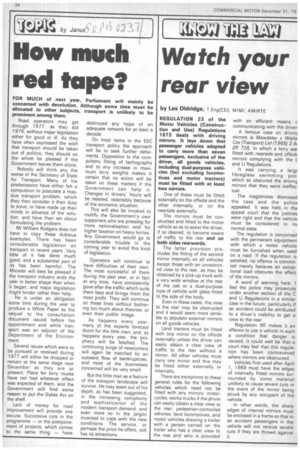How much red tape?
Page 36

If you've noticed an error in this article please click here to report it so we can fix it.
FOR MUCH of next year. Parliament will mainly be concerned with devolution. Although some time must be allocated to other subjects, transport is unlikely to be prominent among them.
Road operators may get through 1977, as they did 1976, without major legislation either for good or ill. As they have often expressed the wish that transport should be taken out of politics, they should on the whole be pleased if the Government leaves them alone_ Nobody will think any the worse of the Secretary of State for Transport. Many of his predecessors have either felt a compulsion to postulate a massive transport problem, which they then consider it their duty to solve; or have made up their minds in advance of the solution, and have then set about formulating the problem.
Mr William Rodgers does not have to copy these dubious examples. There has been considerable legislation on transport in recent years. Very little of it has done much good, and a substantial part of its has been harmful. The Minister will best be pleased if the transport industry ends the year in better shape than when it began, and major legislation might hinder rather than help.
He is under an obligation some time during the year to produce a White Paper as the sequel to the consultation document issued before his appointment and while transport was an adjunct of the Department of the Environment.
Several issues which were to be pursued or resolved during 1977 will either be dropped or remain at the same stage next December as they are at present. Plans for lorry routes have not had whatever effect was expected of them, and the Government will find some reason to put the Dykes Act on the shelf.
Lack of money for road improvement will provide one excuse. Successive cuts in the programme — or the postponement of projects, which comes to the same thing — have destroyed any hope of an adequate network for at least a decade.
On most items in the EEC transport policy the approach will be to seek further deferments. Opposition to the compulsory fitting of tachographs and to any increase in maximum lorry weights makes it certain that no action will be taken on these matters if the Government can help it. Changes in drivers hours will be resisted, ostensibly because of the economic situation.
This will also be invoked to mollify the Government's own supporters who are pressing for more nationalisation and for higher taxation on heavy lorries. Any Government would go to considerable trouble in the coming year to avoid this kind of legislation.
Operators will continue to have difficulties of their own. The most successful of them during the past year, or in fact at any time, have consistently gone after the traffic which suits them best and brings them the most profit. They will continue on these lines without bothering too much about theories, or even their public image.
As happens every year, many of the experts forecast doom for the little man; and, as happens every year, the prophecy will be falsified. The continuing surge of newcomers will again be matched by an outward flow of bankruptcies, and most of the businesses concerned will be very small.
But the little man as a feature of the transport landscape will survive_ He may seem out of his depth, as has been suggested, in the increasing complexity and sophistication of the modern transport demand, and even more so in the jargon invented to cope with the new conditions. The service, or perhaps the price he offers, still has its attractions.




























































